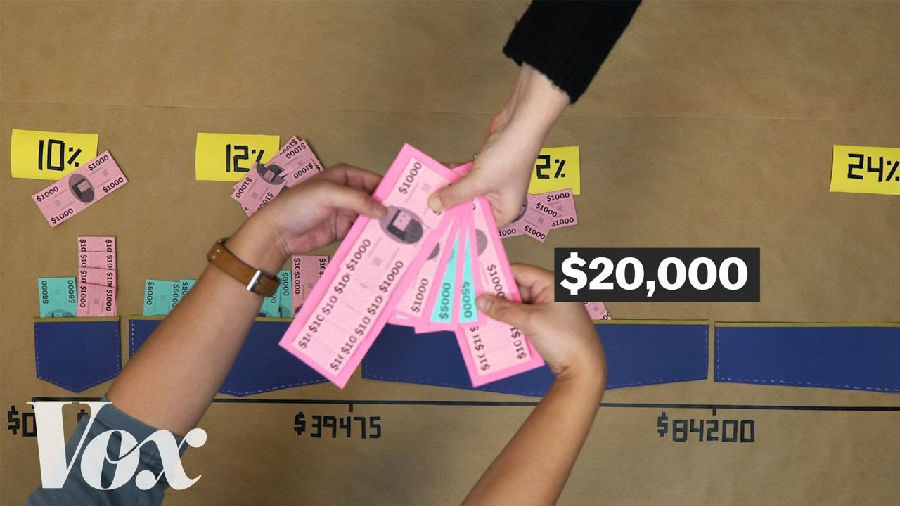These are tax brackets for 2019.
这些是2019年的纳税等级。
Simple, right?
小case,对吧?
But many of us make a common mistake when looking at this.
但我们很多人在看这个的时候都会犯一个常见的错误。
Let's say my income is $84,000.
假设我的收入是8.4w美元。
You might think that puts me in the third bracket.
你可能觉得我应该算到第三个等级。
So I would owe the federal government 22% of my income.
也就是说,我要给联邦政府上缴我22%的收入。
This is wrong.
但这么算其实是错的。
And it's causing us to have uninformed debates about tax policy.
这个问题也让我们对税收政策展开的争论变成了无知的争论。
Here's how it actually works.
税收等级的算法其实是这样。
Let's go back to my $84,000 income.
让我们回到我8.4w美元的收入上。
Now, instead of thinking of tax rates as brackets, we should think of them as pockets.
现在,与其把税率看成是等级倒不如把它们看成是一个一个的口袋。
But first there's one special pocket we need to talk about.
但首先我们要谈的是一个特殊的口袋。
The money we put in this pocket is not taxed.
我们放在这个口袋里的钱是免税的。
The government automatically lets single people put $12,000 in this special pocket — and more for couples.
政府无条件让单身人士先往这个特殊的口袋里放入1.2w美元,夫妻的话可以放更多。

But if you spend a lot of money on things like medical expenses or charitable donations, you can sometimes put in more.
但如果你在医药费或慈善捐款上花了很多钱,那你偶尔还能往这个口袋里放更多。
These are called "deductions."
这个口袋叫“个人所得扣除额。”
With the $70,000 that's left over, we can start filling up the pockets.
剩下的7万美元,我们就可以往前面的那些口袋里放了。
This first pocket has room for $9,700, so I only pay 10% on this money.
第一个口袋只能放9700美元,这个口袋里的钱我只要交10%的税就可以了。
Then I pay 12% on the money in the next pocket.
接下来这个口袋要交12%的税。
And then 22% on the money in this pocket.
第三个口袋要交22%的税。
These are called marginal tax rates.
这些税率就是所谓的“边际税率”。
And that's how these brackets actually work.
也是这些征税等级的计算原理。
So if I get a raise, that new money goes into the first pocket with empty space.
如果我加薪了,新增的钱就要放入第一个还有空间的口袋。
When space runs out, we put it in the next pocket.
这个口袋的空间用完了之后,就接着往下一个口袋里放。
So the raise, and only the raise, would be partially taxed at 22%.
所以加薪的这笔收入,而且只有加薪的这部分收入,的一部分需要交22%的税。
And partially at 24%.
剩下的部分交24%的税。
So, when politicians say they want to raise the top tax rate,
所以,政客们说他们想要提高最高税率时,
it doesn't necessarily mean these pockets — and your money — are affected.
并不一定意味着这些口袋——以及你放在这些口袋里的钱——就会受到影响。
They're talking about the tax rates on the pockets way over there,
他们说的是比你要交的税率高得多得多的那些口袋的税率,
which are only used once people have filled in these smaller one.
所以他们的政策只会影响到那些已经装满了所有这些金额更小的口袋的人。
Marginal tax rates are a pretty simple concept, once you get the hang of it.
一旦掌握了,边际税率其实就是一个非常简单的概念。
So the next time a politician says the government wants to take away 70% of your income" just send them this video
所以下次有政客说政府想“拿走你70%的收入”时,大家不妨把这个视频发给他们看看。












